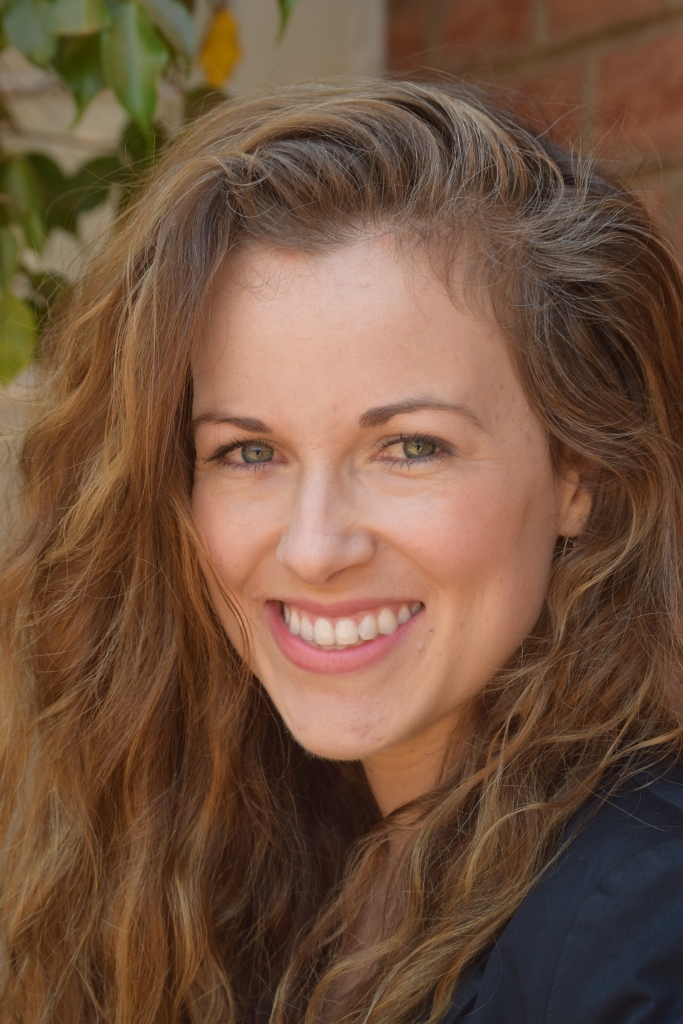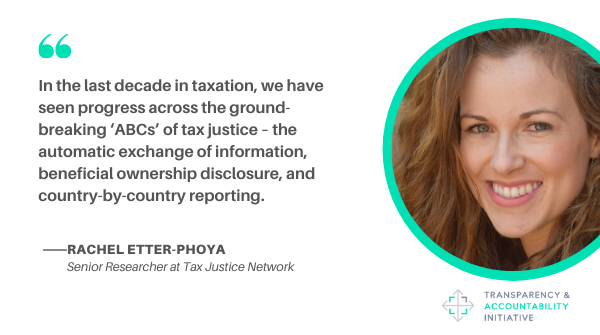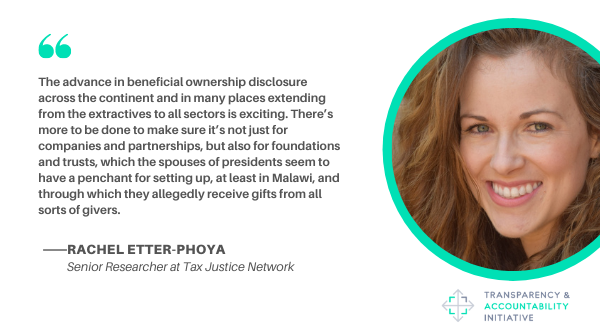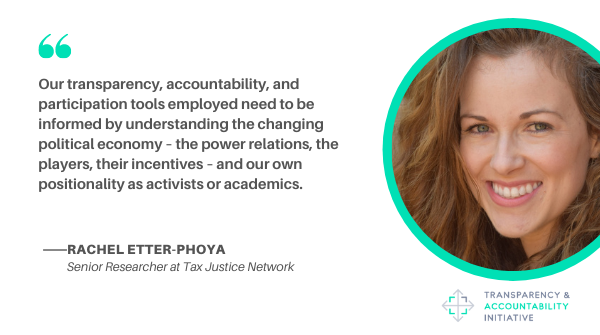
Rachel Etter-Phoya
While serving as an intern at the age of 14, Rachel Etter-Phoya witnessed the abduction of a journalist who has been critical of corruption in the government. Such experiences, especially those in her teen years, strongly fuelled her desire to serve society. Over the last decade, she has focused much energy on transparency and accountability in the extractives sector and more recently in taxation. Rachel currently serves as Tax Justice Network’s Senior Researcher, Anglophone African Hub, and Advisor with FCDO-financed adaptive governance programme Traction. In her free time, she can be found working with Malawian start-up Logos Open Culture to help shift narratives about Malawi.
To start – can you tell us more about yourself, your career journey, and what motivated you to work on transparency and accountability issues around taxation?
When I was 14, I stood close to the bottom of a staircase in an office in Lilongwe’s old town. Twenty people or so from the United Democratic Front’s youth wing came storming down the stairs, abducting a journalist. They bundled him into a vehicle without plates. I was doing work experience at the now defunct The Chronicle which was speaking strongly, consistently, fearlessly out against corruption in the government. Such experiences, and especially those in my teen years, strongly informed the way I desire to serve society. I was raised in Malawi with parents from two secrecy jurisdictions (!) – Switzerland and the UK – who moved here to work with church leaders. The way they live and raised me shaped the way I see the world and the importance of doing meaningful work that contributes, ideally in a compassionate, collective way, to a more equitable society. For me, this has involved a number of different chapters, and in the last decade I have focused much energy on transparency and accountability in the extractives sector and more recently in taxation.
 Women are dramatically underrepresented in both the tax and natural resource industries. How would you say the situation for women has changed over the last decade? Are there unique challenges women face in pursuing a career development path best suited to their needs?
Women are dramatically underrepresented in both the tax and natural resource industries. How would you say the situation for women has changed over the last decade? Are there unique challenges women face in pursuing a career development path best suited to their needs?
Yes – we are dramatically underrepresented. There are some positive changes, but it depends on where you look and who you are. The unique challenge of being a mother is definitely first and foremost on my mind as that’s the season I entered a few years back. I’m privileged to have paid work and to work for an organisation that strives to be feminist in both its work and operations. This means, for starters, we have a parental leave policy for staff spread across the world that provides paid leave regardless of domestic legislation. So, it is far better than what I would have been entitled to under Malawian law where female employees receive only eight weeks of paid maternity leave every three years. But until we can stop describing this sort of situation as a privilege, you know there are systems to change!
Broadly speaking, how much diversity, inclusion, and equity have you seen in regards to tax agendas? What do you expect in the next few years?
Let’s start with the significant changes. In the last decade in taxation, we have seen progress across the ground-breaking ‘ABCs’ of tax justice – the automatic exchange of information, beneficial ownership disclosure, and country-by-country reporting. All of these policies make it harder for multinational companies and individuals to squirrel away wealth at the expense of the rest of us. More broadly the discussions and agreements on international tax reforms, including the global corporate minimum tax, we are presently witnessing, may be historic, but they are certainly not inclusive. We learned that 131 countries joined the plan to reform the international tax system, but if the recent statement by the African Tax Administrators Forum is anything to go by the OECD/G20 Inclusive Framework is not living up to its name. If the process is to produce an equitable outcome it will be important that developed countries do not exert political pressure on developing countries.
The great power imbalance explains why the reforms emerging leave lower-income countries high and dry, and possibly worse off if unilateral tax measures, like digital service taxes, have to be eliminated. How can it be inclusive when not all countries are at the table? I’m yet to see Malawi with a seat. And that’s the case for about half of Africa! It’s unconscionable. But as we see, time and time again, some lives and livelihoods matter much more.
From your experience, how can transparency, accountability, and participation tools advance beneficial ownership and tax governance in Africa? What are the persisting challenges and how can they be addressed?
On tax governance, there are two central struggles – one to stop tax abuse and another to stop the revenue collected from being wasted. And you feel this when a third of your monthly salary goes to the revenue authority, but the public services often do not deliver and anyone who can forks out for all sorts of private goods, like health, education, security, that should be provided by the state through taxes. As a result inequality just keeps growing. But these two struggles are not sequential and must be combined, as the Global Alliance for Tax Justice Dereje Alemayehu recently said at the Tax Justice Network 2021 Annual Lecture.
 I see beneficial ownership disclosure as a policy that speaks to these two struggles. The advance in beneficial ownership disclosure across the continent and in many places extending from the extractives to all sectors is exciting. There’s more to be done to make sure it’s not just for companies and partnerships, but also for foundations and trusts, which the spouses of presidents seem to have a penchant for setting up, at least in Malawi, and through which they allegedly receive gifts from all sorts of givers. There have been opportunities to advance beneficial ownership disclosure where there’s a collection of people participating, often with different even divergent interests, pushing for its introduction and enforcement. It is vital in order to level the playing field for companies in public procurement, to crack down on money laundering, to deter politicians from misrepresentations in asset declarations, to improve tax compliance. I could go on!
I see beneficial ownership disclosure as a policy that speaks to these two struggles. The advance in beneficial ownership disclosure across the continent and in many places extending from the extractives to all sectors is exciting. There’s more to be done to make sure it’s not just for companies and partnerships, but also for foundations and trusts, which the spouses of presidents seem to have a penchant for setting up, at least in Malawi, and through which they allegedly receive gifts from all sorts of givers. There have been opportunities to advance beneficial ownership disclosure where there’s a collection of people participating, often with different even divergent interests, pushing for its introduction and enforcement. It is vital in order to level the playing field for companies in public procurement, to crack down on money laundering, to deter politicians from misrepresentations in asset declarations, to improve tax compliance. I could go on!
Leaks and good investigative journalism also help to shape the public’s consciousness about what needs to change. Of course, huge pushback exists where there interests of the elite are being unsettled. That’s why our transparency, accountability and participation tools employed need to be informed by understanding the changing political economy – the power relations, the players, their incentives – and our own positionality as activists or academics. And then using this information as we work. Some of this comes naturally, seen in how we learn to navigate bureaucracy in our own lives, but it can get quashed by the pressures of fitting work into a results based frameworks.
If you had one piece of advice for anyone looking to develop a career in research, what would it be?
One? That’s hard! But as I am an activist researcher or a researcher activist, I’d say build bridges and relationships with those who care about the same thing and most definitely with those who see it and approach it in different ways. Even in contrary ways. Learn with them. Embrace the discomfort of that process. It will challenge you, it will make you grow, it will make you rethink how you are doing things and it will make the research more robust and relevant…and ‘weather-changing’ as we believe at the Tax Justice Network.

Finally, if you could share a meal with any individual (celebrities/mentor), living or dead, who would they be? And why? 😊
For her fortitude and selflessness, I would love to have shared a meal with the late Lomathinda Rose Chibambo. I feel we became acquainted through co-editing a book written by Malawian scholar Timwa Lipenga in which she captured Ma Rose’s story in her own words. So, who was she? Ma Rose was thrown into prison by the British imperial government two days – yes just two days! – after giving birth to her daughter for organising and leading the women’s resistance movement for Malawi’s independence. She went on to become the first female cabinet minister in Malawi and then spent decades in exile after standing up to Malawi’s then self-declared life president Dr Hastings Kamuzu Banda.
Love to hear more from Rachel? Follow her on Twitter at @MiningInMalawi.


